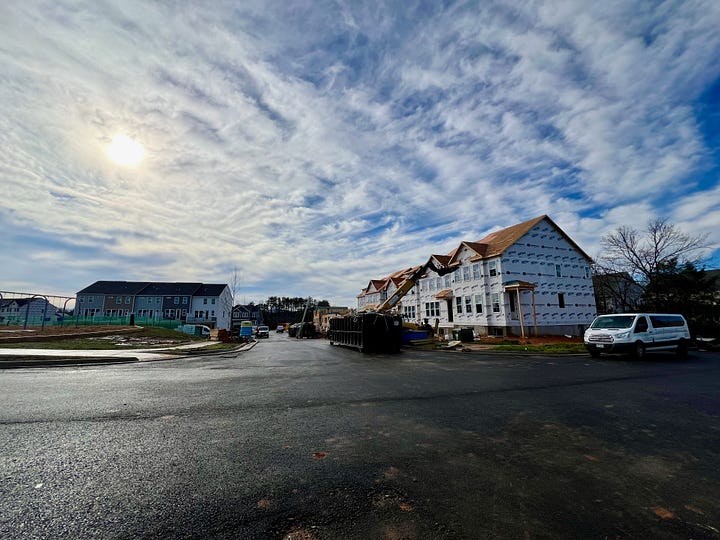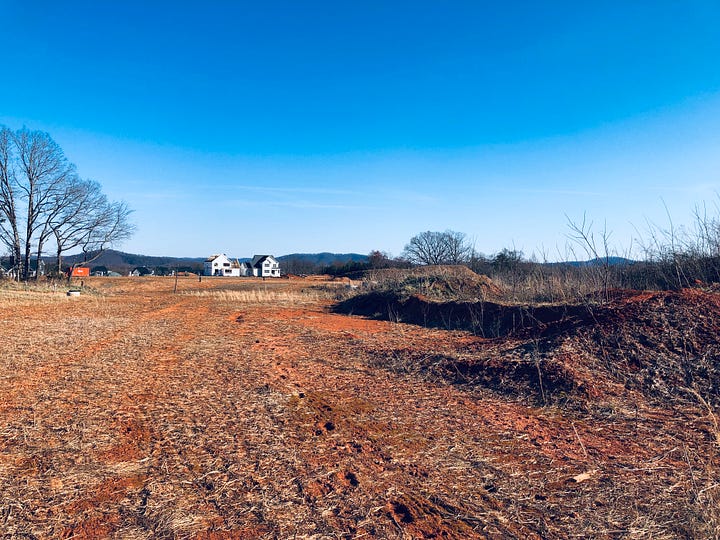Happy December, nearly January. Next month, I’ll be level-setting 2024’s Charlottesville area real estate market. This month — the value of knowing what’s around the corner, seeking community, the market and an offer to you to talk about your house’s value.
Questions? I’m always here. 434-242-7140 or reply to this note (after sharing with a friend, if you’re so inclined).
The Market.
The year is nearly over, final closings will be taking place this week. And 2024 will be a new start. 2023 saw ups (interest rates) and downs (inventory), and lots of changes on the horizon (lawsuits).
What’s 2024 going to bring? I’ll tell you in June of 2025. I know this — any analysis not done for you exclusively will be too broad for anything other than conversation.
Interested in a check-in on your house’s value, if only to just see if Zillow is accurate?Ask me - just reply to this email.
Best answer right now? I suspect we’re going to see a bit more of the same.
The City of Charlottesville has revamped its zoning, and despite the angst, I suspect the effects will be slow and then fast.
Albemarle County remains a great place to live, and new construction shows that people a) want to live here and b) haven’t been able to find existing houses to fill their housing needs. As of 27 December, 1,685 homes have sold in Albemarle; 503 (30%) of those were new construction. Last year 1,854 homes sold; 442 (24%) were new. We’ll see more new construction.
Average sold price of the 611 single-family homes that have sold in 2023 in Albemarle County with at least 3 bedrooms and 2 baths in 2023? $820K. Median? $662K.
Average price of the 200 single-family homes that sold in 2023 in the City of Charlottesville with at least 3 bedrooms and 2 baths in 2023? $706K. Median? $604K.
Interest rates are falling. 6.5% is much better than 8.25%. We’re going to see more buyers coming to the market, and keep having low inventory — many buyers already have homes, and either don’t have mortgages or have rates under 4%, so they won’t be sellers.
When representing sellers, for pricing and marketing conversations, we talk about how many homes they will be competing with. For buyers, we talk about how many homes will come on the market that will fit in their specific market segments.
For January, I’m working on a level-setting post: number of homes on the market, prices, days on the market, what may be hot (or cold) market segments, and a bit more. I generally write these to satisfy my own curiosity and hope that you find it interesting, too.
For those looking to buy or sell next year — what questions do you have?
We knew it was coming. It still sucks.


And that’s okay.
We bought our home in 2004. We’re still there. (“Move” is a four-letter word.) We knew the field where the road ends would one day be houses. We talked about it when we made the offer, knowing that the place where our dogs pooped would become a new neighborhood.
Welp, now that the road is open, and we are welcoming new pedestrians, bike riders, dogs, and fast cars, I’m glad that we knew it was coming.
Despite my efforts to have the road opened to only people not in cars, and for Albemarle County to make a decision that worked to alter human movement patterns, the road is open. (They were walking/riding as soon as it was possible before the road was opened — why not try to encourage that?)
And I’m glad we knew. And it still sucks. And it’s great — more people walking, riding, and yes driving. And if the County ever actually builds the road they’ve been promising, it will be even more walkable and bikeable to downtown Crozet.
I’ve long written about how I represent my clients with professionalism, empathy, and shared experiences — marriage, job changes, kids, grandkids, aging parents, and now firsthand, having the adjacent property change use, altering our enjoyment of the home. Not worse, but different. Change is good.
Related stories: The Four Corners Principle and If You Don’t Own it, It’s Going to Change.
Loving what I do
I paid to renew my license the other day. $80 to the Commonwealth of Virginia. I guess I’m doing this for another couple of years.
6.5/7 days, I wake up, and I’m happy and grateful to do what I do — representing people buying or selling homes, guiding them as appropriate through significant, important, sometimes traumatic, life events.
I’d like to think that loving what I do comes through in how I represent my clients; I’m always learning, always trying to do the right thing for my clients, and never ever feeling like I’m good enough at what I do to stop asking lots of questions — and I ask my clients to ask questions, too!
The emotions of a home
Working on for next month: Every home buying or selling decision is filled with emotions. Knowing that, and knowing how and when to either work to pull them back, or allow them to build, is one of the unspoken, and untaught skills required (in my opinion) for effective representation.
Updating my thinking | Seeking Community
99% of my clients express some degree of, “we want to be part of something — a community, friends, etc.”
A few examples:
“We would like to be in a neighborhood with lots of kids, a good community vibe, sidewalks, ideally near walking trails, and with a sense of privacy would be great.
“So that we can feel settled and to establish ourselves within the community”
“Walkability, community, access to trails, good schools, and "outdoorsy" culture”
“Want to plant roots/sense of permanence/build community, ability to somewhat customize since we've been renting forever (for example: paint if we want), investment, and we've built up enough savings for a down payment.”
I wrote the following in 2016, and I’ve evolved (I’d like to think that evolution is an improvement)
I do care about my clients, but I care about their kids more. Here’s my explanation:
Years ago I had the humbling awareness of the gravity of the decisions my clients, with my guidance and advice, were making. One of my favorite parts of what I do (and one of the reasons that if I were to win the lottery big I’d still practice real estate) is helping clients buy a home and then representing them when they sell years later.
Often, in that time, kids happen and grow. The adults, as I say, tend to be reasonably intelligent and responsible people – tasked with making life decisions that will impact not only the rest of their lives but the lives of their kids as well. Their kids have no say in the matter and are entirely dependent on the adults making good decisions.
And that’s terrifying. For all of us. So I do care about you, I just recognize that the kids tend to matter more. Darn it.
After explaining my reasoning to a client recently, part of her response was
“Have a wonderful time coaching (soccer) today and thank you so much for taking the time to help me. Thank you for keeping my kids at the center of your attention!”
Yeah, that’s why I do what I do.
A few years after I wrote that I was talking to clients and they pushed back a bit on my thinking. “Yes, we love our kids and want them to be happy, but we want to be happy and have friends, too.”
Yep. I don’t think I was wrong, but my view was myopic. Maybe that was due to the particular life stage I was in.
What I’m Reading
3 cities face a climate dilemma: to build or not to build homes in risky places
How does climate change threaten where you live? A region-by-region guide.
Tree Canopy Declines in Charlottesville - I’m having more clients ask about trees and neighborhoods.
‘I’m not buying new stuff anymore’: the young people getting into ‘degrowth’ — more of this, please
HUD and DOE Announce New Partnership to Decarbonize U.S. Building Sector at COP28
What I’m Listening To
Housing Oversupply: What the Industry is Actually Facing Long Term - I’ve been saying most of this for years; now I’ve heard it described by someone way smarter than I.
99% Invisible - Long Strange Tape - if you like the Dead and taping, this is good.
The Daily - Should You Rent or Buy? The New Math. — Contrary to the propaganda by the lobbyists, not everyone should buy a home.










